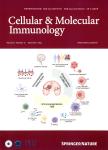Cannabinoids drive Th17 cell differentiation in patients with rheumatic autoimmune diseases
在有风湿病的自体免疫的疾病的病人的 Cannabinoids 开车 Th17 房间区别作者机构:Laboratory of Molecular Immunology and Division of Clinical Immunology and RheumatologyUniversity of CologneCologneGermany DepartmentⅠof Internal MedicineUniversity of CologneCologneGermany
出 版 物:《Cellular & Molecular Immunology》 (中国免疫学杂志(英文版))
年 卷 期:2021年第18卷第3期
页 面:764-766页
核心收录:
学科分类:1002[医学-临床医学] 100201[医学-内科学(含:心血管病、血液病、呼吸系病、消化系病、内分泌与代谢病、肾病、风湿病、传染病)] 10[医学]
基 金:supported by a grant from the Fritz Thyssen Foundation(10.17.2.019 MN to D.M.K.) by the Koln Fortune Program of the Faculty of Medicine of the University of Cologne(to L.G.and D.M.K.) by the foundation"Exzellenz initiieren"-Stiftung Kolner Krebsforschung(to D.M.K.) supported by a fellowship from the German Federal Ministry of Education and Research(BMBF):Professorinnenprogramm Ⅱ,Forderung der Regelprofessur im Fach Archaoinformatik(01FP14039G,Projekt-No.4600/8116/01)
摘 要:The legalization of cannabinoids for medical use has reinforced their emerging role as a treatment of chronic pain in patients with cancer or rheumatic diseases.1,2 In addition to their role as pain relievers,evidence obtained from animal models suggests that cannabinoids have immunosuppressive properties.3 However,a definite immunosuppressive function of cannabinoids has not yet been confirmed in clinical trials.




